When it comes to gut health, the phrase “you are what you eat” couldn’t be more true. Registered dietitian Jo Travers from Love Your Gut Week says that our diet’s diversity is crucial to keeping our gut in top shape – so much so that it can influence everything from our digestion to our mental health.
“The more variety in your diet, the more diversity in your gut bacteria, and that means they can do more jobs to keep us healthy,” she says. The secret lies in hitting what Travers calls “30 plant points” a week – a simple way to track how many different plant-based foods you’re eating.
The concept is a lot more achievable than it sounds. “You can award yourself a ‘plant point’ for every different plant food you eat in a week,” she explains. And the list of what counts is surprisingly broad: wholegrains, beans, fruits, vegetables, nuts, seeds and even herbs and spices.
Yes, you can get a quarter point for the spices in your curry. “Add olives, capers, spring onions and pumpkin seeds to your lettuce, cucumber and tomato salad, and you’ve already hit seven points in one meal!” she says. Easy enough, right?
It all comes down to feeding your gut bacteria the right variety of fibres and nutrients they need to thrive. “Different bacteria eat different fibres, so the greater the variety of fibres you get, the greater the variety of bacteria your gut can support,” Travers says.
And the more diverse that gut bacteria is, the more useful they become for your overall health. “A diverse microbiome can do more for us – from digesting food properly to producing postbiotics that keep our cells functioning properly.”
But gut health isn’t just about digestion. The gut is involved in nearly every system in the body. It even communicates directly with the brain through something called the gut-brain axis. “If gut health is disrupted, this can impact our mood,” Travers explains, pointing to the growing evidence linking gut imbalances to mental health issues like anxiety and depression.
As if that wasn’t enough, about 70 per cent of our immune cells live in the gut, meaning a healthy microbiome is essential for fighting off illness. “The gut interacts with almost every other organ system in the body in one way or another, so maintaining good gut health is key to overall health,” she adds.
Fermented foods also play a big part in supporting that balance. “Fermented foods, such as yoghurt, kimchi, sauerkraut and tempeh, contain live bacteria that can help populate our gut or interact with the bacteria already there,” says Travers. There’s no magic number for how often you should eat them, but she suggests aiming for daily inclusion. “Most experts agree that daily seems to produce the most benefits,” she says. So if you’re into your kombucha or enjoy some yoghurt for breakfast, you’re already doing your gut a favour.
For those who feel daunted by the idea of completely overhauling their diet, Travers offers a much more laid-back approach: it’s not about cutting things out, but about adding more in. “You don’t have to cut out meat altogether to get the benefits of plant-based foods,” she reassures. Instead, she suggests a “semi-skimmed” approach – where you gradually add in more plant-based foods without radically changing your meals. “For example, swapping out half of the mince in your bolognese for lentils will give you some of these fibres while still keeping your overall diet similar.” And you don’t need to plan an elaborate meal either – just having tins or pouches of beans and lentils handy to throw into salads, sauces, or soups can help you notch up those plant points. “Think of it as adding more to your diet rather than taking things away.”
Certain ingredients are what Travers calls “gut heroes”: powerful foods that go above and beyond when it comes to supporting your microbiome. “We tend to think of food in terms of nutrients, but actually food is so much more complex than that,” she says. Mushrooms, seeds and cruciferous vegetables like broccoli and cauliflower are all top contenders. “Mushrooms, for example, have thousands of chemical compounds that aren’t typically classified as nutrients but have been shown to support health.” These ingredients contain not only fibre but polyphenols, which are compounds that also help to fuel the gut microbiome.
One of the most common misconceptions about gut health is that gut issues are something you just have to live with – but Travers wants to make it clear that’s not the case. “If you have gut health issues, you don’t have to put up with them,” she says, noting the many resources available through Love Your Gut Week to help people improve their gut health. One helpful tool is a food, mood and symptom diary, which allows you to track how the changes you make to your diet are affecting your gut and overall wellbeing. “You can really see the progress you’re making over time.”
And how long does it take to see results? “It depends on the person, but many people start seeing positive changes within a few weeks of making changes to their diet,” Travers explains. Improvements can range from better digestion and bowel habits to reduced cholesterol and insulin resistance.
That said, it’s not about adopting a strict or complicated routine. Small, sustainable changes can make a big impact on your gut health. “You don’t need to completely change what you’re eating overnight,” she says. “Start by adding a few more plant foods each week and incorporating some fermented foods where you can.” The idea is to experiment with new fruits, vegetables, grains and legumes, gradually increasing the variety on your plate. “It’s about broadening what’s on your plate, not narrowing it.”
What’s important to remember is that your gut doesn’t operate in isolation. As Travers emphasises, “The gut is linked to almost every other system in the body,” so when your gut is healthy, the rest of your body benefits too. From boosting digestion and immunity to improving your mood and cognitive function, focusing on gut health has wide-reaching rewards.
Incorporating more plants and fermented foods into your daily meals may seem like a small step, but it’s one that can lead to big results. “It’s about adding more good stuff, rather than focusing on what you’re cutting out,” says Travers. With every new plant food or fermented dish you try, you’re not only nourishing yourself, but also feeding the diverse community of bacteria in your gut – bacteria that are quietly working to keep you healthy, day in and day out.
With all this in mind, feeding your gut doesn’t have to be complicated or boring – it can be deliciously simple. By adding just a few more plant-based ingredients and fermented foods to your meals, you're not only boosting your gut health but supporting your overall wellbeing. And the best part? You don’t need to overhaul your diet to make a difference. These recipes, packed with gut-friendly ingredients, are a great place to start, making it easy (and tasty) to hit those 30 plant points a week.
Breakfast muffins
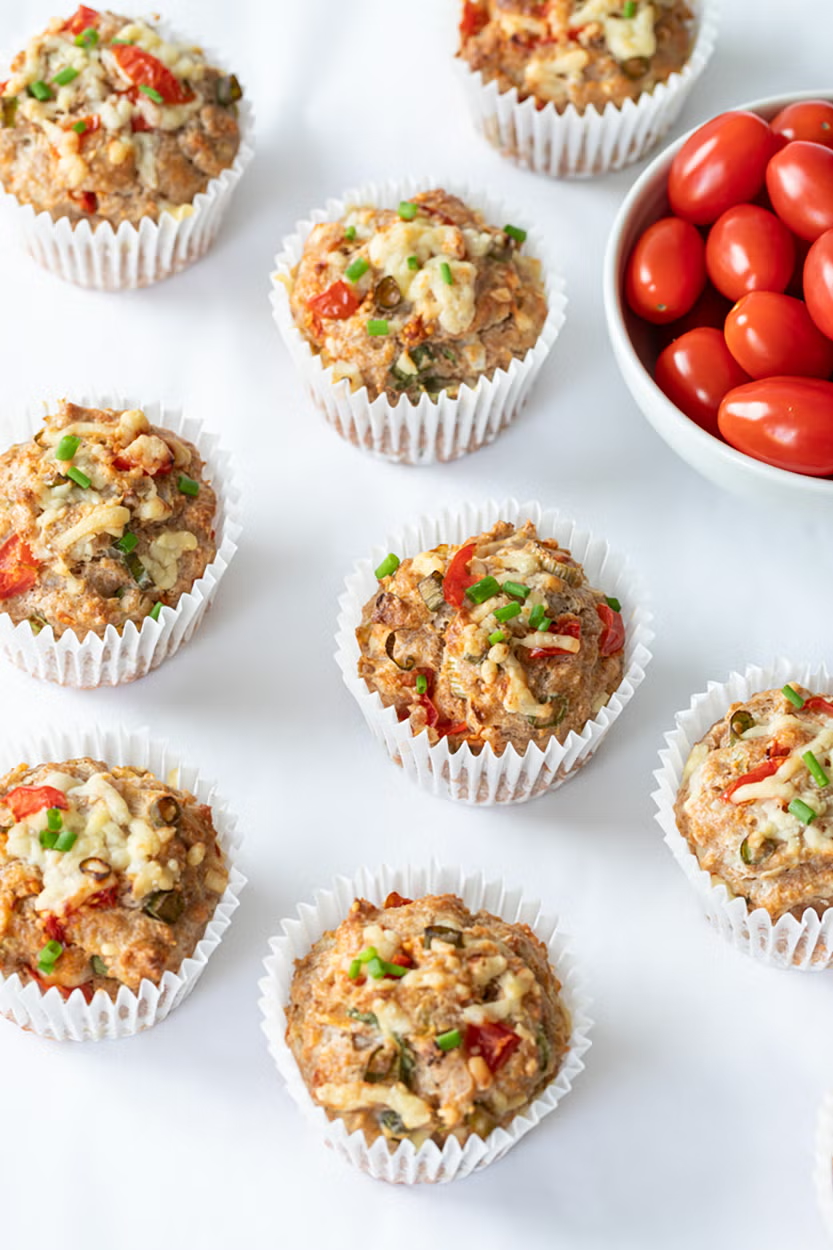
These breakfast muffins are quick, tasty and perfect for busy families on the go. They can be made in advance and frozen, so you’ve always got a nutritious and gut-friendly breakfast ready.
Makes: 9 muffins
Prep time: 10 minutes | Cooking time: 15 minutes
Plant points: 3 plant points per serving
Ingredients:
200g wholemeal, self-raising flour
40g unsalted butter, melted
60ml semi-skimmed milk
1 tbsp natural yoghurt
2 medium eggs, beaten
5 cherry tomatoes, quartered
3 spring onions, trimmed and sliced
100g Cheddar cheese, grated
Method:
1. Preheat oven to 180C fan/gas mark 4. Line a muffin tin with 9 standard-sized muffin cases
2. Place the flour into a large bowl and make a well in the centre. Pour the melted butter, milk, yoghurt and beaten eggs into the flour. Stir the ingredients until the mixture is just coming together. Add a splash of milk if the batter looks too dry. It should be dropping consistency.
3. Gently fold in the chopped tomatoes, spring onions and three-quarters of the grated cheese.
4. Divide the mixture between the paper muffin cups on the prepared tray. Scatter the remaining cheese over the muffins before placing them in the oven.
5. Bake for 15-18 minutes until just beginning to brown and when a skewer inserted into the centre comes out cleanly.
6. Allow the muffins to cool for 5 minutes before placing on a wire rack to cool completely.
7. Alternative serving suggestions: substitute 120g of any of the vegetables mentioned in this recipe, with grated carrots, courgettes or diced red pepper.
Cooking tip: Savoury muffins are freezer-friendly. Store in a snap-lock bag or an airtight container. They will keep in a freezer for 3 months.
Gut-friendly hero ingredients:
Wholemeal flour contains more dietary fibre than white flour. Fibre is transported to the large bowel to be fermented by microorganisms that live there. Fermentation produces short-chain fatty acids which play an important role in keeping the lining of the gut healthy, supporting the immune system, regulating metabolism and communication between the gut and the brain. Eating fibre also helps to reduce the blood glucose response following a meal and keeps you feeling fuller for longer.
Tomatoes have a red pigment which contains lycopene, a type of antioxidant that is digested mainly in the large bowel. Recent research indicates lycopene may play a role in keeping the thin layer of the gut healthy.
Onions contain a variety of beneficial biologically active compounds that have anti-inflammatory effects. They also contain complex carbohydrates that have prebiotic properties that help keep the population of microorganisms in the gut healthy.
Chopped-up veggie breakfast
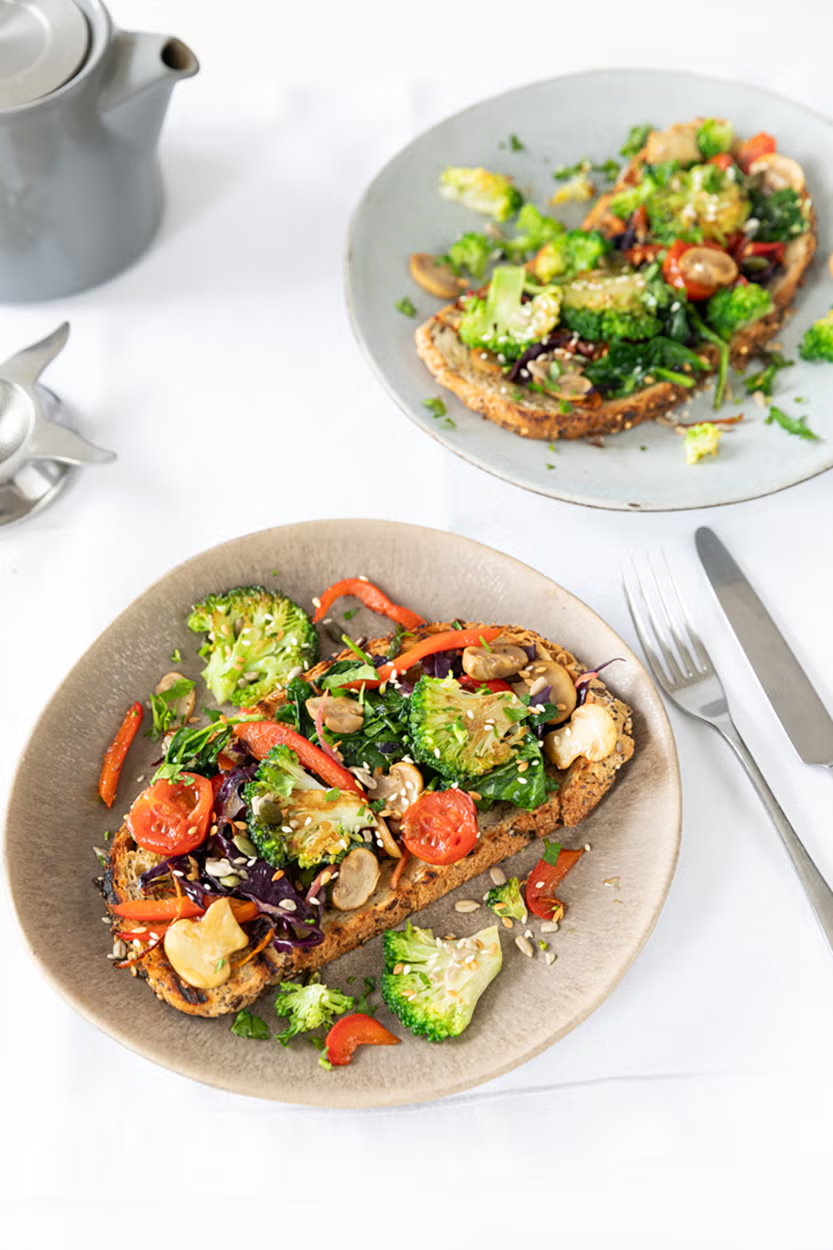
Eating a healthy mix of lightly sautéed, tasty vegetables is a great way to start the day. Use fresh or cooked leftover vegetables to help reduce food waste. Toasted seeds add a crunchy texture and provide extra nutrients.
Serves: 4
Prep time: 10 minutes | Cooking time: 15 minutes
Plant points: 9 per serving
Ingredients:
40g cabbage, shredded
30g carrot, grated
50g red pepper, deseeded and thinly sliced
50g button mushrooms, sliced
50g baby spinach leaves
4 cherry tomatoes, cut in half
130g cooked broccoli, roughly chopped
2 tbsp light olive oil
50g mixed seeds, toasted in a small frying pan
4 large slices of wholemeal bread
Method:
1. Drizzle a little olive oil over the base of a large frying pan and heat gently.
2. Add the cabbage, carrot, red pepper, mushrooms and cherry tomatoes to the pan and cook for 5 minutes until soft, moving the vegetables around the pan to ensure they cook evenly.
3. Add the spinach and broccoli and continue to cook for a further 5 minutes.
4. While the vegetables are cooking, toast the bread. Brush the toast with a little olive oil and arrange on four plates.
5. Pile the sautéed vegetables evenly between the four pieces of toast. Scatter with toasted seeds.
Alternative serving suggestions: For a more substantial brunch dish, top the sautéed vegetables with a poached egg or add cubes of tofu.
Cooking tip: Use a large shallow frying pan to sauté the vegetables. The vegetables need space to move around the pan to cook evenly.
Gut-friendly hero ingredients:
Seeds contain dietary fibre, which provides food for the gut bacteria to ferment. This supports the growth of a healthy, diverse population of microorganisms in the gut. Sunflower seeds, pumpkin seeds, sesame seeds and flax seeds are rich sources of mono and polyunsaturated acids (healthy fats). These healthy fats have anti-inflammatory properties that can help reduce inflammation in the gut caused by unhealthy gut bacteria.
Mushrooms are rich in carbohydrates and are prebiotics. They stimulate the growth of beneficial gut microorganisms, promote a healthy gut and have wider health benefits including supporting the immune system’s strength and resilience.
Mixed vegetables such as cabbage, broccoli, tomatoes and spinach help to keep the gut healthy because they contain an abundance of polyphenols. When polyphenols reach the bacteria in the gut they are broken down into smaller by-products and used as fuel to produce chemicals that have multiple effects on supporting a healthy immune system.
Vietnamese beef salad
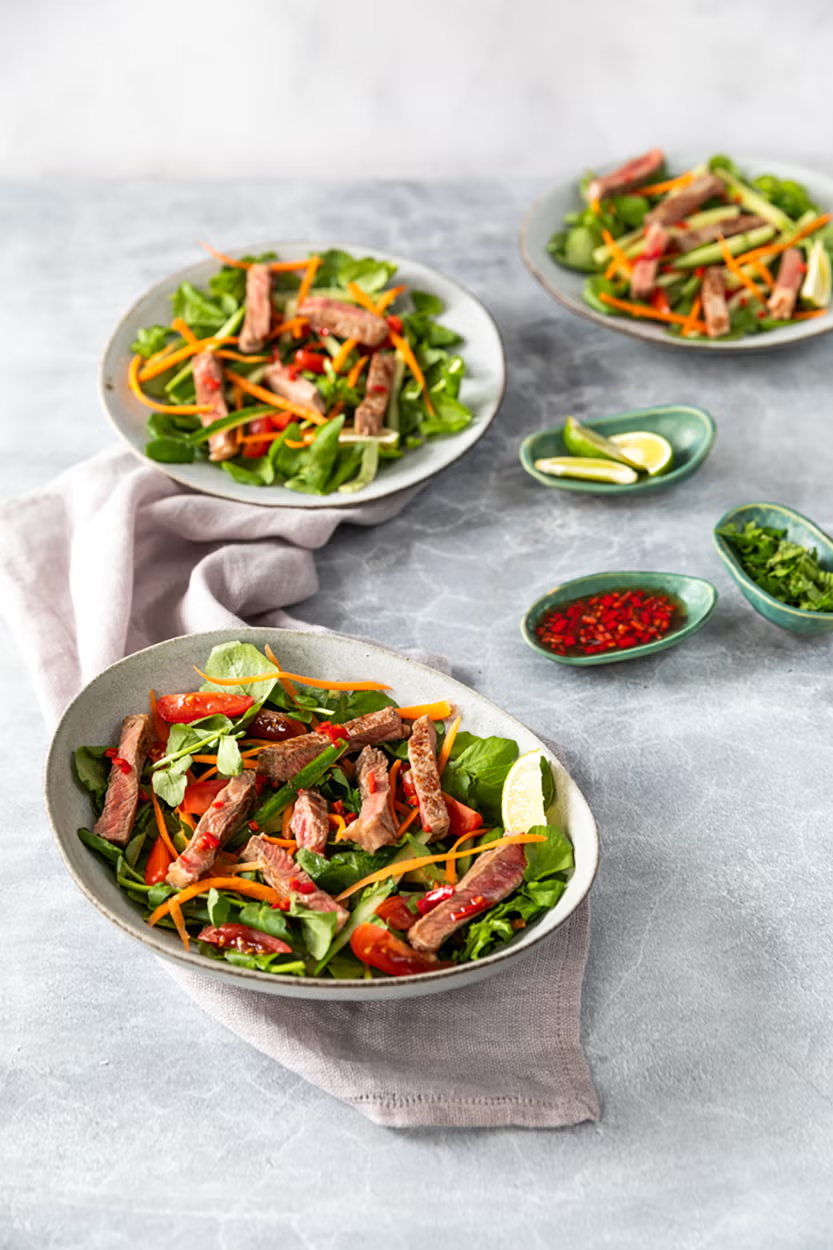
A tasty, speedy dinner which pairs a mixture of vibrant, colourful vegetables with strips of succulent, juicy steak and a side of zesty, flavoursome dressing. This fresh and light salad is nutritious as it combines a variety of vegetables with a touch of protein.
Serves: 4
Prep time: 15 minutes | Cooking time: 15 minutes
Plant points: 6.5 per serving
Ingredients:
1 tsp rapeseed oil
1 red chilli, deseeded and chopped
1 lime, juiced
Pinch of sugar
2 tbsp fish sauce
30g parsley, roughly chopped
30g fresh mint leaves, roughly chopped
½ medium length of cucumber, cut into matchstick-sized pieces
Medium carrot, cut into matchstick-sized pieces
Bunch of watercress, thick stems removed
8 cherry tomatoes, quartered
2 large sirloin steaks
Method:
1. In a bowl, mix chilli with the lime juice, sugar and fish sauce thoroughly, and then set aside. This will be your dressing.
2. Place the chopped parsley and mint on a serving platter and scatter over the pieces of carrots and cucumber. Arrange the watercress and tomatoes over the salad.
3. Preheat a large non-stick frying pan. Lay the steaks in the pan and cook each side for 2-3 minutes. They should be browned on the outside and pink inside.
4. Remove from the pan and place on a chopping board. Slice the steaks into finger-thick strips and scatter over the salad. Drizzle with the dressing.
Alternative serving suggestions: Prawns are a tasty seafood alternative to steak. Flash fry in a little oil and scatter over the salad.
Cooking tip: Remove the seeds from chilli with a teaspoon to avoid contact with hands.
Gut-friendly hero ingredients:
Green leaves like watercress and herbs are packed full of vitamins and minerals. Dark green leaves contain a range of polyphenols which are good for gut health. Polyphenols help to increase the diversity of bacteria in the gut and help good bacteria thrive. Green leaves also have anti-inflammatory properties, which may help keep the lining of the gut healthy.
Herbs are an easy way to help keep your gut healthy. People who eat more than 30 different plant types per week (including herbs) have a more diverse range of bacteria living in their gut than those who eat 10 or fewer types of plants per week.
Colourful plant foods can encompass a range of vitamins and minerals, including vitamin C, vitamin E, iron, potassium and more. Eating the rainbow is a simple strategy to ensure you’re getting a wide range of vitamins and minerals in your diet.
Spiced lamb kebabs with cannellini beans
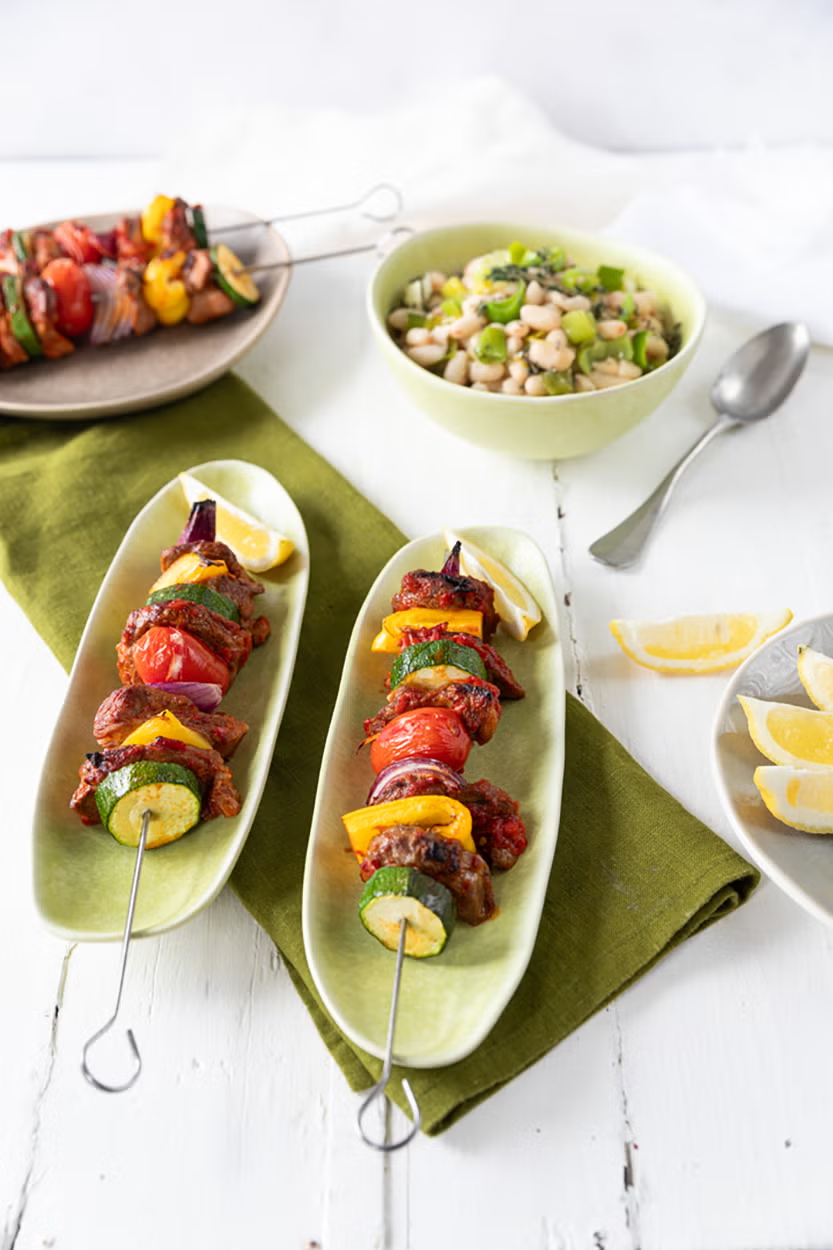
This is a tasty, speedy dinner, which pairs a mixture of colourful vegetables, chunks of succulent lamb and a side of flavoursome cannellini beans.
Serves: 4
Prep time: 15 minutes | Cooking time: 15 minutes
Plant points: 6.5 per serving
Ingredients:
For the kebabs:
400g lamb steak, cut into 2cm cubes
1 yellow pepper, cut into 2cm cubes
4 cherry tomatoes
1 courgette, cut into 1cm rings
1 medium red onion, cut into 8 wedges
3 tbsp harissa paste
2 tbsp extra virgin olive oil
For the beans:
1 leek, trimmed
1 tbsp olive oil
2 x 400g cans cannellini beans, drained
Small bunch of thyme
To serve:
1 lemon, cut into 4 wedges
4 skewers
Method:
1. Place the diced lamb into a bowl and stir in the harissa paste. Mix well and leave the lamb for at least half an hour. Thread alternate pieces of lamb and vegetables (pepper, cherry tomatoes, courgette and onion) onto the skewers. Set aside.
2. For the beans: slice the leek lengthways and wash carefully to remove any grit. Slice the leek finely.
3. Drizzle a tablespoon of olive oil into a saucepan and heat gently. Add the sliced leek and cook until soft. Add the drained beans and 150ml of water. Strip the thyme leaves from their stalks and add to the beans. Cook gently for 5 minutes.
4. Preheat the grill. Drizzle a tablespoon of olive oil over the kebabs before placing under a medium grill. Cook the kebabs for 10-15 minutes, turning frequently. The kebabs are cooked when the meat is browned and the vegetables are soft and browning around the edges.
5. Serve the kebabs with a portion of beans and a slice of lemon.
Alternative serving suggestions: Chicken, large prawns or cubes of halloumi cheese can be used instead of lamb. Also, chickpeas work well instead of cannellini beans.
Cooking tip: Avoid the temptation to cook kebabs on a fierce heat. It is much better to cook them on a medium heat for a longer time. A longer cooking time allows the meat to become tender and develop a good flavour.
Gut-friendly hero ingredients:
Canned pulses contain protein, lots of dietary fibre and are low in fat, as well as providing a significant source of vitamins and minerals, such as iron, zinc, folate, and magnesium. Dietary fibre has two important roles in the gut. It helps digested food pass through the gut by bulking the stool, and feeds the bacteria in the colon, aiding gut health.
Olive oil, a staple in the Mediterranean diet, is a source of monounsaturated fats which help to maintain levels of “good” HDL cholesterol and reduce levels of “bad” LDL cholesterol in your blood.
Peppers and tomatoes help to keep the gut healthy because both are good sources of vitamin C.
Cauliflower steaks with rice and red kidney beans
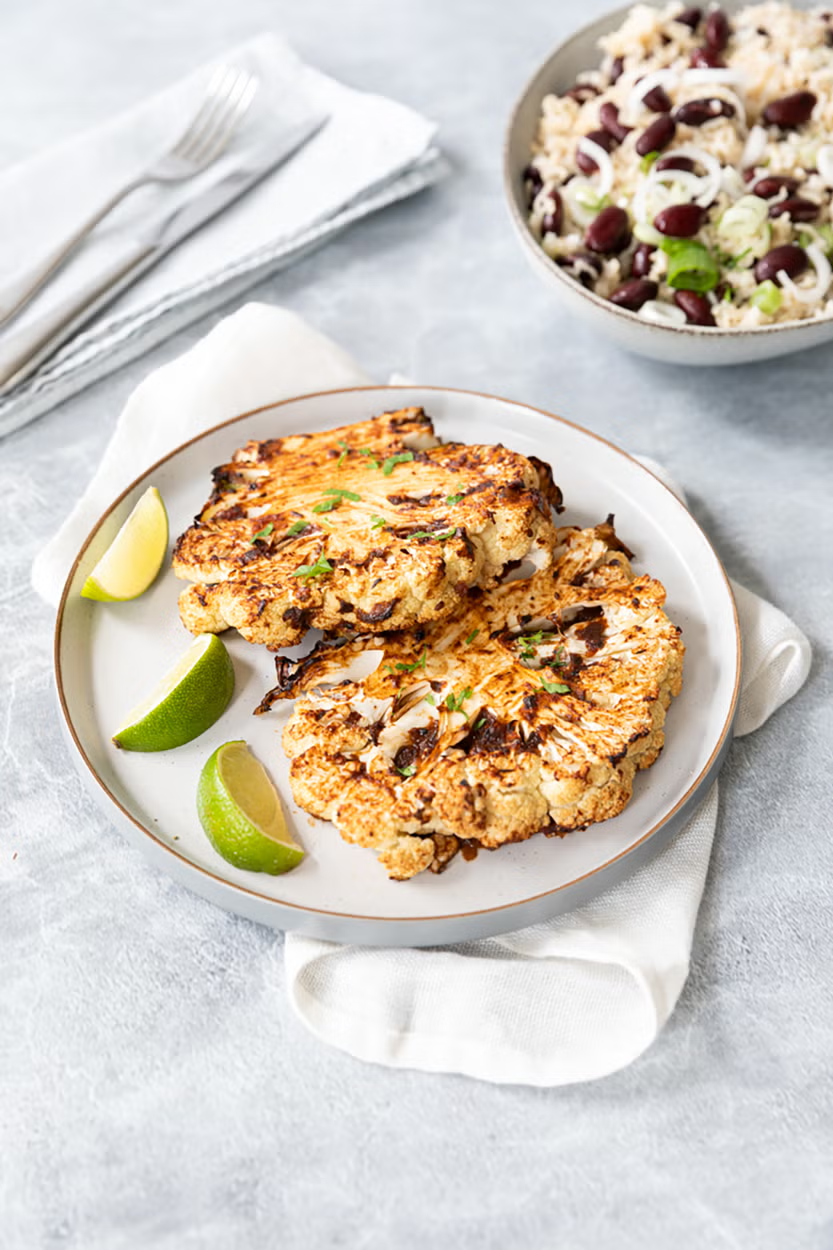
Transport yourself to Jamaica with this vibrant and flavourful Jamaican-inspired recipe. Enjoy hearty slices of cauliflower brushed with spicy jerk paste, paired with coconut rice and protein-packed red kidney beans.
Serves: 4
Prep time: 15 minutes | Cooking time: 30 minutes
Plant points: 5 per serving
Ingredients:
2 medium-sized cauliflowers
2 tbsp jerk paste
2 limes, 1 juiced, 1 cut into wedges
1 tbsp vegetable oil
200g brown basmati rice
400ml coconut milk
400g tin red kidney beans, drained and rinsed
6 spring onions, trimmed and sliced
Method:
1. Preheat the oven to 200C fan/gas mark 6. Cut 2 thick slices from the middle of each cauliflower. Mix the jerk paste and lime juice together. Lay the cauliflower steaks on an oiled baking tray and brush with the jerk paste.
2. Bake the cauliflower steaks in the oven and roast for 25 minutes until the stem is tender and the cauliflower is charred at the edges.
3. Meanwhile, combine the rice, coconut milk and 300ml water in a saucepan. Bring to a simmer, cover the saucepan, and cook gently for 20 minutes or until the liquid has been absorbed and the rice is cooked. Add the red kidney beans for the final 5 minutes of cooking. Stir half the spring onions through the rice and beans.
4. Serve the cauliflower steaks with rice and beans, accompanied by a wedge of lime. Scatter the remaining spring onions over the dish.
Alternative serving suggestions: Borlotti beans or black beans can be used instead of red kidney beans. If you cannot find jerk paste, brush the cauliflower steaks with olive oil and sprinkle over ½ tsp of ground cumin, ½ tsp ground coriander, and ½ tsp chilli flakes.
Cooking tips: You can get between 2 and 4 cauliflower steaks from each cauliflower, depending on its size. Leftover cauliflower is delicious roasted or made into soup.
Gut-friendly hero ingredients:
Cauliflower is a cruciferous vegetable. Cruciferous vegetables are rich in nutrients, including vitamins C, E and K. They are also a good source of dietary fibre. Cruciferous vegetable consumption has been associated with a decreased risk of multiple types of cancers. Studies have shown higher consumption of cruciferous vegetables is associated with a lower risk of cancer, especially of the digestive tract.
Brown basmati rice contains 3.3g fibre per 100g (raw) making it a good choice for increasing the fibre content of a meal.
Red kidney beans are high in protein, resistant starch and dietary fibre. Resistant starch is important in the diet because it resists digestion, passing directly through the small intestine to the colon. Resistant starch is then fermented by “good bugs”, which plays an important role in reducing inflammation, increasing calcium absorption and maintaining the health of the gut lining.
Chocolate, date and nut cake
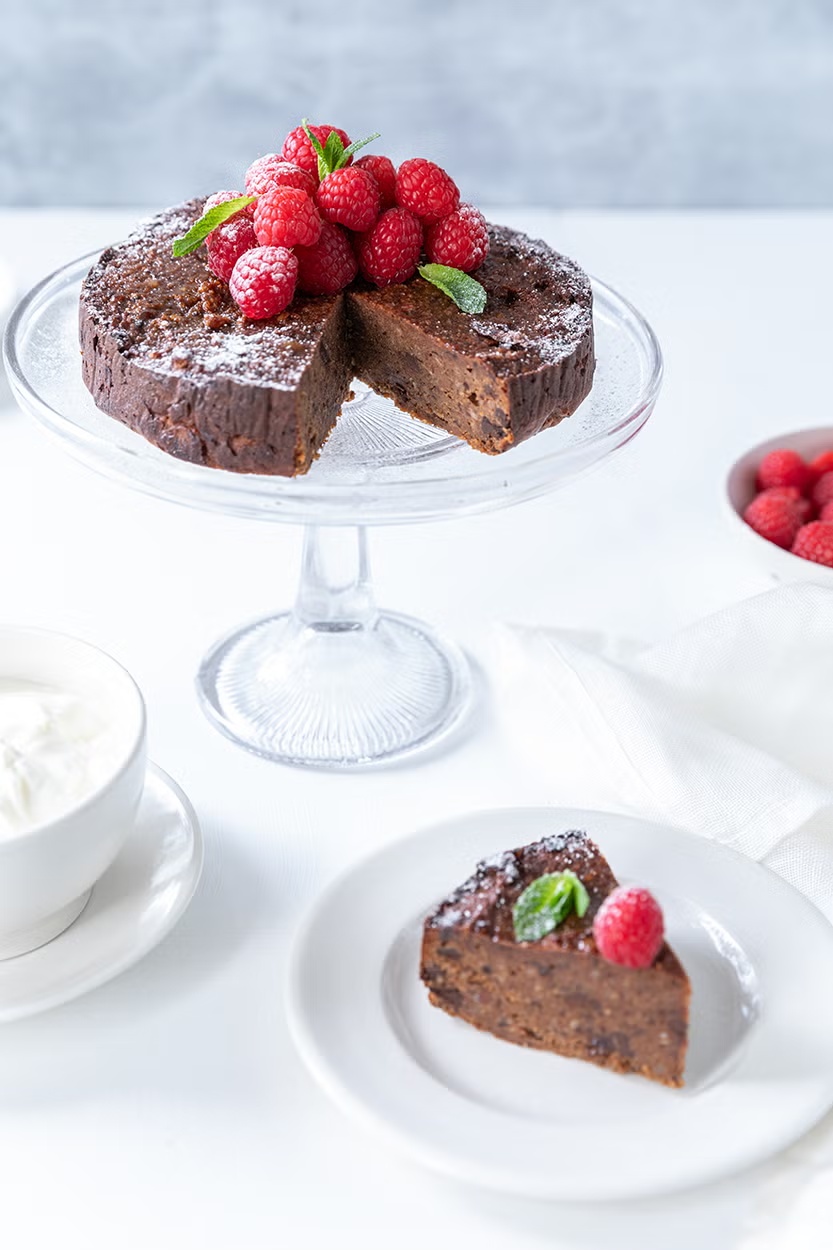
An easy-to-bake showstopper chocolate cake with a prune, date and nut twist. This recipe uses ground almonds instead of flour and has no added sugar. Best enjoyed with a mid-morning cuppa.
Serves: 4-6
Prep time: 15 minutes | Cooking time: 25 minutes
Plant points: 5 per serving
Ingredients:
175g soft dates, pitted
175g soft prunes, pitted
1 small orange, juice and zest
125g ground almonds
3 eggs, beaten
1 tsp vanilla extract
3 tbsp cocoa powder
50g unsalted butter
70g dark cooking chocolate (70% cocoa solids), roughly chopped
To serve:
100g fresh raspberries
Method:
1. Preheat the oven to 175C fan/gas mark 5. Roughly chop the dates and prunes. Place in a bowl together with the orange juice and zest and mix well.
2. Transfer the dates and prunes to the bowl of a food processor and add the ground almonds, eggs, vanilla extract, cocoa powder and butter. Process for one minute and then stop and scrape around the bowl of the food processor to ensure even mixing.
3. Add the roughly chopped dark chocolate. Process the mixture for another 30 seconds until well combined.
4. Scrape the mixture into a lined 17cm (7in) loose-bottom cake tin and bake for 25 minutes or until firm to touch. Let the cake cool slightly before removing from the cake tin.
5. Serve the chocolate cake with a pile of fresh raspberries, crème fraiche or Greek yoghurt.
Alternative serving suggestions: Slices of this cake would be delicious served with a compote of dark cherries or a portion of defrosted frozen cherries.
Cooking tips: This recipe also works well made with 250g of soft dates or any combination of dates and/or prunes. The butter should be at room temperature so it can mix easily with the other ingredients. To store the cake, place in an airtight tin or container, and leave in a cool place.
Gut-friendly hero ingredients:
Dried fruit such as prunes, and dates are high in fibre. Prunes can help the passage of food through the gut. A recent study showed that in healthy individuals with infrequent stool habits and low fibre intake, prunes significantly increased stool weight and frequency. Eating dates may enhance colon health by increasing beneficial bacterial growth and inhibiting the proliferation of colon cancer cells. Early research data suggests that date intake may aid in the maintenance of bowel health.
Almonds are a good source of nutrients such as vitamin E, monounsaturated fatty acids and polyunsaturated fatty acids. They are also high in fibre. Eating almonds may lead to an improvement in the diversity of gut bacteria.
Berries such as raspberries provide a range of flavanols, which are good for gut health, as well as being a good source of vitamin C. They help to increase the diversity of bacteria in the gut and have a range of benefits including their antioxidant and anti-inflammatory properties.
Dark chocolate has been shown to have many health benefits. It contains polyphenols, which encourage the growth of beneficial gut bacteria, while reducing the number of potentially harmful ones.
For further information and resources, visit loveyourgut.com
Disclaimer: The copyright of this article belongs to the original author. Reposting this article is solely for the purpose of information dissemination and does not constitute any investment advice. If there is any infringement, please contact us immediately. We will make corrections or deletions as necessary. Thank you.



